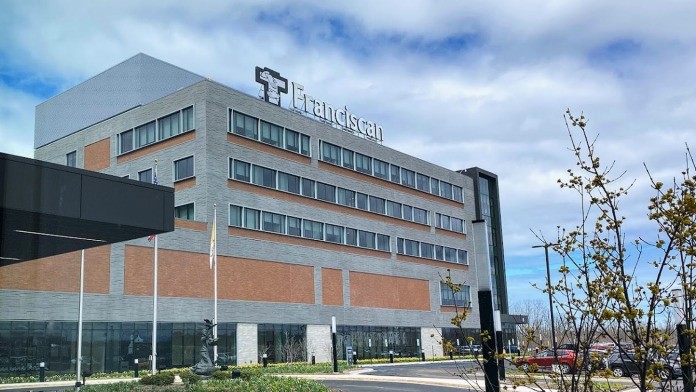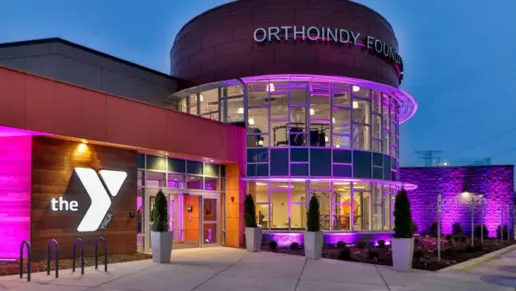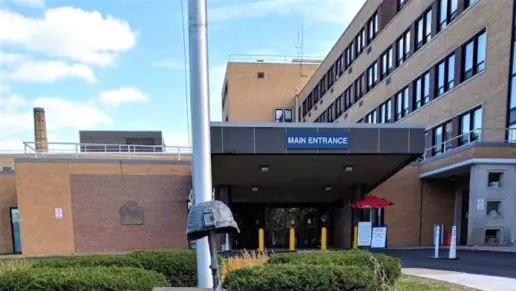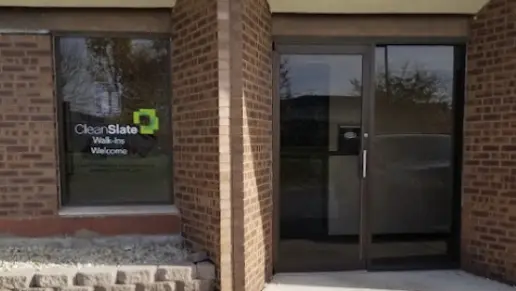Recently walked in cuz I had bereavement hallucinations after losing my Mom unexpectedly. They treated me like I was a frickin' lunatic! Taking my hair tie, my necklace with a locket containing my Mom's remains so that I couldn't "hang myself" with them. Talked to Dr 30 seco ...
About Franciscan Saint Anthony Psychiatric Services
Franciscan Saint Anthony Psychiatric Services has several locations, including the one on Franciscan Way in Michigan City, Indiana. The Michigan City location has an inpatient facility with 123 private beds as well as outpatient services. This is a new facility providing cutting edge equipment and services. They treat addiction and co-occurring mental health disorders through the outpatient clinic. You can use your insurance and may also be eligible for financial assistance with or without insurance.
This healthcare provider takes a holistic approach to treatment. The staff believes in providing integrated services for the spirit, body and mind. They’ll design a mental and behavioral health treatment plan that’s custom to client needs whether the client is a child, teen or adult. They also believe that long term recovery programs are a critical part of mental health services.
The addiction services at this facility are for adults and include detoxification, support and counseling through the outpatient programs. If you need acute inpatient medical detoxification, they’ll refer you to one of their other locations. You can also get a referral for medication assisted treatment (MAT).
Outpatient addiction treatment includes their intensive outpatient treatment (IOP) program. In this program, you’ll work with registered nurses and psychiatric therapists. The environment is supportive and structured, and you’ll participate in group and individual therapy. You’ll also attend educational lectures about substance use and mental health.
Therapies such as cognitive behavioral therapy (CBT) teach you to turn your negative thought patterns into more positive, helpful thought patterns. You’ll learn problem solving techniques to help you avoid situations where you may be tempted to use substances. Therapists will help you address past trauma through counseling and mindfulness practices. The facility specializes in treating the co-occurring disorders of anxiety, depression, attention deficit hyperactivity disorder (ADHD), bipolar disorder, post traumatic stress disorder (PTSD) and schizoaffective disorders.
Latest Reviews
Rehab Score
Gallery

Location
Other Forms of Payment
Medicaid is a state based program that helps lower-income individuals and families pay for healthcare. Medicaid covers addiction treatment so those enrolled can use their coverage to pay for rehab. When a program accepts Medicaid the client often pays very little or nothing out of their own pocket.
Private insurance refers to any kind of healthcare coverage that isn't from the state or federal government. This includes individual and family plans offered by an employer or purchased from the Insurance Marketplace. Every plan will have different requirements and out of pocket costs so be sure to get the full details before you start treatment.
Self-pay involves paying for treatment out of your own pocket. You can use savings or credit, get a personal loan, or receive help from family and friends to fund your treatment. If you don't have insurance or your insurance plan doesn't cover a specific program, self-pay can help ensure you still get the care you need.
Medicare is a federal program that provides health insurance for those 65 and older. It also serves people under 65 with chronic and disabling health challenges. To use Medicare for addiction treatment you need to find a program that accepts Medicare and is in network with your plan. Out of pocket costs and preauthorization requirements vary, so always check with your provider.
Addiction Treatments
Levels of Care
Treatments
Many of those suffering from addiction also suffer from mental or emotional illnesses like schizophrenia, bipolar disorder, depression, or anxiety disorders. Rehab and other substance abuse facilities treating those with a dual diagnosis or co-occurring disorder administer psychiatric treatment to address the person's mental health issue in addition to drug and alcohol rehabilitation.
Mental health rehabs focus on helping individuals recover from mental illnesses like bipolar disorder, clinical depression, anxiety disorders, schizophrenia, and more. Mental health professionals at these facilities are trained to understand and treat mental health issues, both in individual and group settings.
Programs


Clinical Services
Cognitive Behavioral Therapy (CBT) is a therapy modality that focuses on the relationship between one's thoughts, feelings, and behaviors. It is used to establish and allow for healthy responses to thoughts and feelings (instead of unhealthy responses, like using drugs or alcohol). CBT has been proven effective for recovering addicts of all kinds, and is used to strengthen a patient's own self-awareness and ability to self-regulate. CBT allows individuals to monitor their own emotional state, become more adept at communicating with others, and manage stress without needing to engage in substance abuse.
Whether a marriage or other committed relationship, an intimate partnership is one of the most important aspects of a person's life. Drug and alcohol addiction affects both members of a couple in deep and meaningful ways, as does rehab and recovery. Couples therapy and other couples-focused treatment programs are significant parts of exploring triggers of addiction, as well as learning how to build healthy patterns to support ongoing sobriety.
Dialectical Behavior Therapy (DBT) is a modified form of Cognitive Behavioral Therapy (CBT), a treatment designed to help people understand and ultimately affect the relationship between their thoughts, feelings, and behaviors. DBT is often used for individuals who struggle with self-harm behaviors, such as self-mutilation (cutting) and suicidal thoughts, urges, or attempts. It has been proven clinically effective for those who struggle with out-of-control emotions and mental health illnesses like Borderline Personality Disorder.
Experiential therapy is a form of therapy in which clients are encouraged to surface and work through subconscious issues by engaging in real-time experiences. Experiential therapy departs from traditional talk therapy by involving the body, and having clients engage in activities, movements, and physical and emotional expression. This can involve role-play or using props (which can include other people). Experiential therapy can help people process trauma, memories, and emotion quickly, deeply, and in a lasting fashion, leading to substantial and impactful healing.
Research clearly demonstrates that recovery is far more successful and sustainable when loved ones like family members participate in rehab and substance abuse treatment. Genetic factors may be at play when it comes to drug and alcohol addiction, as well as mental health issues. Family dynamics often play a critical role in addiction triggers, and if properly educated, family members can be a strong source of support when it comes to rehabilitation.
Group therapy is any therapeutic work that happens in a group (not one-on-one). There are a number of different group therapy modalities, including support groups, experiential therapy, psycho-education, and more. Group therapy involves treatment as well as processing interaction between group members.
In individual therapy, a patient meets one-on-one with a trained psychologist or counselor. Therapy is a pivotal part of effective substance abuse treatment, as it often covers root causes of addiction, including challenges faced by the patient in their social, family, and work/school life.
Nutrition therapy, aka medical nutrition therapy (MNT), is a way of treating physical, emotional, and medical conditions through diet. Specific dietary plans are designed by professional nutritionists or registered dietitians, and patients follow them in order to positively affect their physical and mental health.
Contact Information
3500 Franciscan Way
Michigan City, IN 46360


